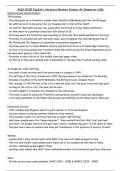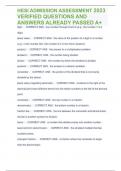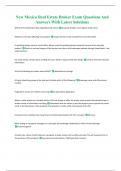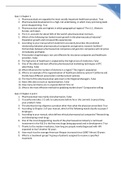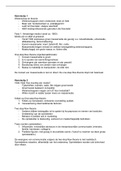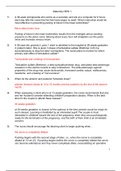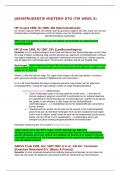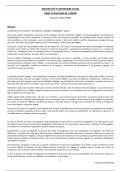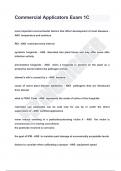AQA GCSE English Literature Modern Drama: An Inspector Calls
Historical and Social Context
JB Priestley
- Priestley grew up in Yorkshire middle class, Bradford (Midlands just like the Birlings)
- he suffered a lot in his early life, his traumas link to that of Eva Smith
- his mother died when he was very young (Eva Smith has no living family members)
- he then went to a grammar school but left school at 16
- Priestley spent his formative years working in factories (Eva Smith worked in a factory)
- Priestley is very political with socialist views, which explains the contrasting parties of
- Mr Birling and the Inspector (capitalism vs socialism argument)
- Priestley went on to study Modern History and Political Science in Cambridge University
- he had critical successes and travelled round the world during the Great Depression so he
has seen what poverty state looks like
- Preistley is very critical of the middle class and upper class
- he felt as if they were selfish and irresponsible in the way they treated working class
An Inspector Calls Settings
- the book is both written and first performed in London in 1945
- the setting of the story is based on a 1912 Spring evening in an industrial city Brumley
- Brumley is located in the north Midlands, the Birling’s house is based there
- the concept of 1912 Britain is the rich is and will stay rich, the poor is and will stay poor
- as long as the rich is rich, the poor will be poor
- no state support is needed, nor changes to the status quo
- this book is used to advocate Priestley’s own personal socialist views and ideologies
- criticising capitalism in the Edwardian society successfully as the labour party then won
Edwardian Society
- 1912 is Edwardian England, which is quite similar to Victorian England
- factory owners could pay workers whatever they wanted
- they became really rich and they had lots of power (Mr Birling)
- most poor people were the “deserving poor “, they worked hard but didn't get paid well
- yet most rich people believed the poor were mainly "undeserving poor" & look down on them
- the poor were seen as immoral and have put themselves in the position of poverty & need
Women
- women didn't have voting rights until 1918, they were not seen as equal to men
- the rich and middle-class women were expected to be housewives and stay at home
- as their husbands would support them
- working class women who didn't have husbands worked in factories but paid less than men
Wars
- British society was really unstable, WWI (1914 – 1918) & WWII (1939 - 1945)
, - women took the men’s jobs (who were fighting as soldiers) & did the jobs of men really well
- this convinced many people they deserved equality and they gained the right to vote
- the suffragettes movement in 1903 also impacted on the decision
The Difference in the 1910s & the 1940s
- works on dramatic irony in order to better impart the message & towards positive change
- in 1910s, class systems are more rigids and there are clear divides & expectations
- the political culture was capitalist, the government is controlled by rich business owners
- whereas in 1940s, class systems are less rigid as people join collectively in face of war
- women gain the vote in 1928 and gradually have more equal rights and independence
- the political culture was socialist as people wanted a change
Key Themes
Quotes for Themes of Social class
- Preistley tries to illustrate especially through sympathetic characters eg. Eva Smith
- the deep class divisions that existed in Edwardian England
- how people like Mrs Birling abused their power and abused their privilege
- of being in upper middle society and Gerald abused his upper-class power
- “these young women counting their pennies …”
Pathos, audience will have sympathy for working class
Shows contrast of middle upwards classes and working class
Hints on the obliviousness or selfishness the higher classes have, lack of empathy
- “Public men, Mr Birling, have responsibilities as well as privileges”
Foreshadows to Gerald’s quote “we’re respectable citizens and not criminals”
Suggests there are misuses in power
Further points out the inequality and unfairness between classes
Also uses the technique of Tone, gives off an ominous tone
- “But these girls aren’t cheap labour, they’re people…”
Shows comparison between two things that create tension for the other characters
Figurative contrast and Literary contrast
Hints the lack to compassion the higher classes have using antithesis
- “We are members of one body … …”
Promotes the socialist point of view for social equality
An ideology of a city, something that no one was able to give
Use of tricolon, listing, polysyndeton and persuasive language adds power to the point
Age
- Priestley was very pessimistic when he considered the older generation
Historical and Social Context
JB Priestley
- Priestley grew up in Yorkshire middle class, Bradford (Midlands just like the Birlings)
- he suffered a lot in his early life, his traumas link to that of Eva Smith
- his mother died when he was very young (Eva Smith has no living family members)
- he then went to a grammar school but left school at 16
- Priestley spent his formative years working in factories (Eva Smith worked in a factory)
- Priestley is very political with socialist views, which explains the contrasting parties of
- Mr Birling and the Inspector (capitalism vs socialism argument)
- Priestley went on to study Modern History and Political Science in Cambridge University
- he had critical successes and travelled round the world during the Great Depression so he
has seen what poverty state looks like
- Preistley is very critical of the middle class and upper class
- he felt as if they were selfish and irresponsible in the way they treated working class
An Inspector Calls Settings
- the book is both written and first performed in London in 1945
- the setting of the story is based on a 1912 Spring evening in an industrial city Brumley
- Brumley is located in the north Midlands, the Birling’s house is based there
- the concept of 1912 Britain is the rich is and will stay rich, the poor is and will stay poor
- as long as the rich is rich, the poor will be poor
- no state support is needed, nor changes to the status quo
- this book is used to advocate Priestley’s own personal socialist views and ideologies
- criticising capitalism in the Edwardian society successfully as the labour party then won
Edwardian Society
- 1912 is Edwardian England, which is quite similar to Victorian England
- factory owners could pay workers whatever they wanted
- they became really rich and they had lots of power (Mr Birling)
- most poor people were the “deserving poor “, they worked hard but didn't get paid well
- yet most rich people believed the poor were mainly "undeserving poor" & look down on them
- the poor were seen as immoral and have put themselves in the position of poverty & need
Women
- women didn't have voting rights until 1918, they were not seen as equal to men
- the rich and middle-class women were expected to be housewives and stay at home
- as their husbands would support them
- working class women who didn't have husbands worked in factories but paid less than men
Wars
- British society was really unstable, WWI (1914 – 1918) & WWII (1939 - 1945)
, - women took the men’s jobs (who were fighting as soldiers) & did the jobs of men really well
- this convinced many people they deserved equality and they gained the right to vote
- the suffragettes movement in 1903 also impacted on the decision
The Difference in the 1910s & the 1940s
- works on dramatic irony in order to better impart the message & towards positive change
- in 1910s, class systems are more rigids and there are clear divides & expectations
- the political culture was capitalist, the government is controlled by rich business owners
- whereas in 1940s, class systems are less rigid as people join collectively in face of war
- women gain the vote in 1928 and gradually have more equal rights and independence
- the political culture was socialist as people wanted a change
Key Themes
Quotes for Themes of Social class
- Preistley tries to illustrate especially through sympathetic characters eg. Eva Smith
- the deep class divisions that existed in Edwardian England
- how people like Mrs Birling abused their power and abused their privilege
- of being in upper middle society and Gerald abused his upper-class power
- “these young women counting their pennies …”
Pathos, audience will have sympathy for working class
Shows contrast of middle upwards classes and working class
Hints on the obliviousness or selfishness the higher classes have, lack of empathy
- “Public men, Mr Birling, have responsibilities as well as privileges”
Foreshadows to Gerald’s quote “we’re respectable citizens and not criminals”
Suggests there are misuses in power
Further points out the inequality and unfairness between classes
Also uses the technique of Tone, gives off an ominous tone
- “But these girls aren’t cheap labour, they’re people…”
Shows comparison between two things that create tension for the other characters
Figurative contrast and Literary contrast
Hints the lack to compassion the higher classes have using antithesis
- “We are members of one body … …”
Promotes the socialist point of view for social equality
An ideology of a city, something that no one was able to give
Use of tricolon, listing, polysyndeton and persuasive language adds power to the point
Age
- Priestley was very pessimistic when he considered the older generation


